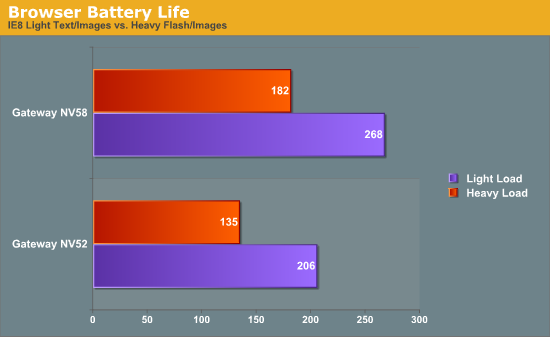Browser Face-Off: Battery Life Explored
by Jarred Walton on September 11, 2009 6:00 PM EST- Posted in
- Laptops
Seven years ago, the browser wars seemed all but ended. AOL bought out Netscape, Microsoft Internet Explorer dominated the market, and the era of browser-based exploits began. In 2003, Microsoft's stranglehold on the browser market didn't change much, but the Mozilla group began their efforts at an open-source alternative. It still took almost two years before we finally saw the birth of Firefox, the first serious contender to the browser throne since the passing of Netscape… okay, so Netscape was more on life-support, but let's not argue semantics.
During the past four years, things have changed to the point where browser market share is a lot more varied. Various browsers have their proponents and opponents, and we've seen plenty of benchmarks demonstrating which browser is the fastest, which have the best JavaScript support, and which best complies with web programming standards. With the launch of Internet Explorer 8, Opera 10, Firefox 3.5, Safari 4, and Chrome during the past year, the market is far more varied than what we've seen in the past. So which browser reigns supreme?
Truth be told, the answer to that question is very subjective. If you have a reasonably fast system, it's unlikely that you will notice the difference between any of the major browsers when it comes to loading typical webpages. Stress tests that focus on JavaScript performance might be meaningful if you visit sites that use lots of JavaScript, and concerns about security, standards support, and availability of plug-ins/add-ons are also potentially meaningful. On average it's probably a wash as to which you'll like "best". If you're trying to figure out which browser is right for you, we suggest looking at the Browser Wars series of articles over at DailyTech.
What we are going to look at today is the impact of your choice of browser on battery life, plain and simple. Except, coming up with a benchmark is neither plain nor simple. We have used several different methods for testing battery life on laptops, and depending on the type of content you're viewing battery life ranges from nearly equal to what you can expect at idle down to roughly the same amount of battery life you would get when viewing high-definition videos. Like it or not, we feel that Adobe's Flash is used on many websites, and so we picked three websites that we frequently visit and used those for our testing. As a point of reference, here's the sort of battery life difference you're looking at when viewing "simple" webpages versus the three websites we selected, from our article comparing AMD and Intel battery life.

Obviously, that's a huge difference in battery life. You get roughly 50% more battery life in simple Internet surfing compared to surfing sites that use of lots of Flash content (along with frames, numerous tables, etc.) Last we checked, your average website is nowhere near what would qualify as "simple", and Flash content is ubiquitous. For better or for worse, we're going to focus on battery life when viewing three websites. One of the websites is AnandTech.com, and the other two shall remain nameless. Suffice it to say, all three sites have approaches to web design that we see replicated all over the Internet.
For testing, we load the three sites into tabs on our test web browser, wait 60 seconds, and then reload all three tabs. We are using three recently tested laptops that offered decent battery life. Two of these are the Gateway NV52 and NV58 that represent the current state of entry-level AMD and Intel laptops. The third is a netbook, the ASUS Eee PC 1005HA. None of these laptops would qualify as high-end solutions, mostly because we don't think users interested in battery life are going to be looking at high-end laptops. These three laptops provide a reasonable view of the current mobile market. If there is interest, we may look at extending this testing to other laptops in the future, but first let's see what sort of results we get from the test candidates.










76 Comments
View All Comments
JarredWalton - Saturday, September 12, 2009 - link
I would agree. Given time I'm sure Anand will get to it. However, even though results under Vista may improve, my testing with Vista laptops tends to confirm the poor battery life he measured. I mean, at idle in Vista I still get worse battery life than OSX got surfing the net (granted not on a MacBook).orthorim - Thursday, September 17, 2009 - link
I use the Mac but if you are testing Windows, test Windows 7. Who cares about Vista? It's going to be replaced in less than a month.eiko027 - Saturday, August 14, 2010 - link
ASUS Eee PC 1005HA and ASUS Eee PC 1000HE , which is bettereiko027 - Saturday, August 14, 2010 - link
http://www.battery-center.net/asus-eee-pc-1005ha-b...eiko027 - Saturday, August 14, 2010 - link
http://www.battery-center.net/asus-eee-pc-1005ha-b...cavin - Tuesday, October 26, 2010 - link
http://www.battery-retail.com/sony-vgp-bps8-batter...